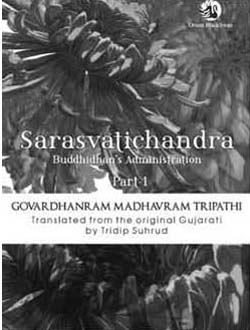Hailed as a landmark literary work, a milestone in the literary history of Gujarat, Sarasvatichandra, Govardhanram Tripathi’s magnum opus is now available in English translation (coincidentally, all the four parts of the novel have been translated into Hindi at this juncture), after 128 years of its publication in Gujarati. It is but natural for the discerning reader to wonder why it was not translated for these many years.
The blurb says: ‘A novel of epic proportions, written in four parts from 1887 to 1901, Sarasvatichandra is both an enactment and the embodiment of the life philosophy of one man, and his sole mission . . . Written sixty years before Independence, the novel holds up a fascinating mirror to Gujarati society of that time, the joint family, particularly the role of women, and life in the princely states, against the backdrop of a nation in transition at the turn of the century—culturally, politically, and ideologically.’ This should be enough to give the reader an idea about the status of a classic that the novel continues to enjoy.
The ‘Translator’s Introduction’ divided into eight sections and running into fortyodd pages is eruditely written by Tridip Suhrud and testifies to his scholarship on nineteenth and twentieth century Gujarat. One wonders whether the subsequent parts will carry the same Introduction. A separate section devoted to each part in detail would have served the reader better. One wishes that the relevant section in Part I had provided detailed information on the erstwhile ‘native states’ (especially in Gujarat) that constituted precolonial India and the sway these States held over society. This section could have been different for the four parts. This would have helped the general readers to benefit from Suhrud’s area of specialization and contextualize the novel better for it is more of a socio-politico-cultural document of Gujarat before a century and a quarter.

